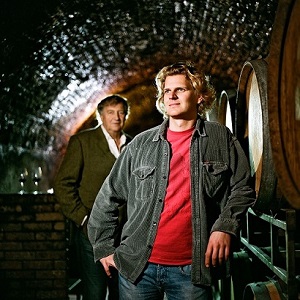Name: Michael Malat

Currently: Winemaker at Malat Winery
Website: www.malat.at
Questions:
Please, tell us about how you got into wine, the wine industry and how your career developed?
I was born into a “wine family”. The family estate which I am now running was established in 1722; I took it over from my parents in 2008 and I am now the 9th generation running it. My parents never pushed me, at least they never pushed me too hard J, to take it over and just tried to integrate me in the family business at a very early stage of my life already, so that I never was thinking of doing something different. During the school time life was easy and you don’t think much about your future, but with the finish of the high school I first thought to myself what my future will be and how it can or should look like. I really asked myself if making and selling wine is the profession I like to do and beside the fact that it is a job with lot of work, responsibility and also risk, I could not find any argument not doing it. Running a wine estate includes so many working fields. You have the chance to work with the nature, you can create something where you at the end can see a result and even taste and enjoy it. You can be creative and also be “global” when selling the wine around the world. So it never gets boring. So after high school I decided to start studying Oenology at BOKU in Vienna (BOKU = University of Applied Life Science and Soil Cultivation). Besides working in the family estate during my studies, I also got some practical experience with working in international wineries around the world (France, USA, Argentina, New Zealand, etc.).
What is your philosophy to making wine and viticulture?
I want to make wine in respect of what nature can give you. I think it is the only way to work WITH your vineyards and WITH nature, but NEVER AGAINST. I like to make wines which are great to drink, not only nice for tasting. My wines always should show elegance and finesse rather than just power and alcohol. I like my wines being clean, straight forward, individual and NOT mainstream. They should always show my personal handwriting and should be able to develop with aging.
Which cultivar is your favourite to work with and why?
Of course, Grüner Veltliner is most important for Austria and also most typical in our area, although I am a lover of the Burgundy grapes Chardonnay and Pinot Noir and also Riesling. Chardonnay is great, because you have so many options, from “Austrian style” which is fruit driven and unoaked, to international character with oak and longer development on the lees, but of course Chardonnay and Pinot Noir are in my case important because of our MALAT Brut and MALAT Brut rosé and it goes without saying, that Pinot Noir is the queen of red grapes anyhow, which is Riesling for the whites. Riesling and the Burgundy grapes need a lot of attention in the vineyard as their skins are much thinner and therefore more sensitive than others and the wines are always elegant and rich in finesse. Last but not least, those grape fit very well to Kremstal, my wine growing region, which is typical for the moderate climate and the temperature differences between day and night.
How do you see the future of wine production and what are the challenges and the opportunities?
It is great to see what new technologies are developing. On the other hand those options are making the wine business more industrialized and technical. It will be interesting to see which wines will be the “winners” in the future. Those being “made” with all the technical possibilities or those with a certain tradition and respect to their natural behaviour. Also, the changing climate might have an influence on how and where wine is growing. That could be challenging in order to see what grapes will grow where the best in the future.
Where do you see the global wine market in 2025?
I think some of the super big countries like China and India will be more and more developed in wine. If the per head per year consumption in these countries will just increase by one litre it will have a tremendous influence on the wine market. On the other hand are already thousands of hectares of vineyards planted e.g. in China and it is difficult to predict what wines will come out of it. But at the end I believe, that wine will still be seen as a high quality product and that in terms of quality it will still be most important where exactly the wine is coming from (Country, Region, Village, Vineyard) and how it is made.
Michael Malat
@ by Dominik Kozlik – Zeitgeist Sommeliers - International Sommelier Positions - www.sommelier-jobs.com

Dominik Kozlik e.U.
78/12 Gruberstr.
4020 Linz, Austria